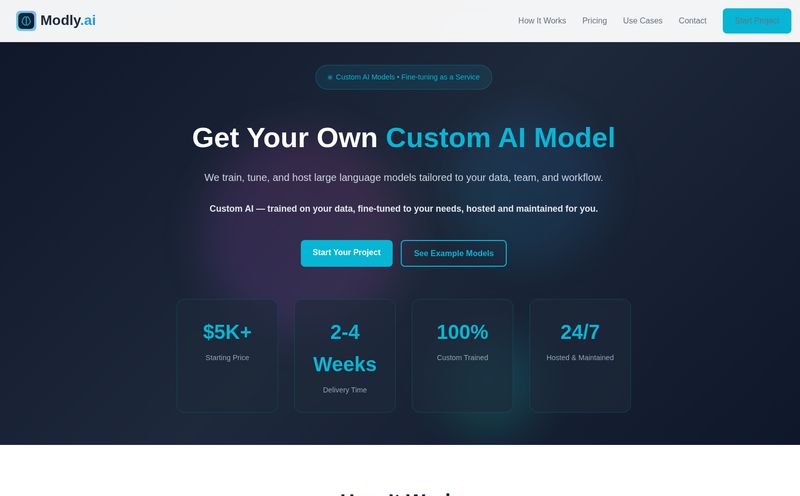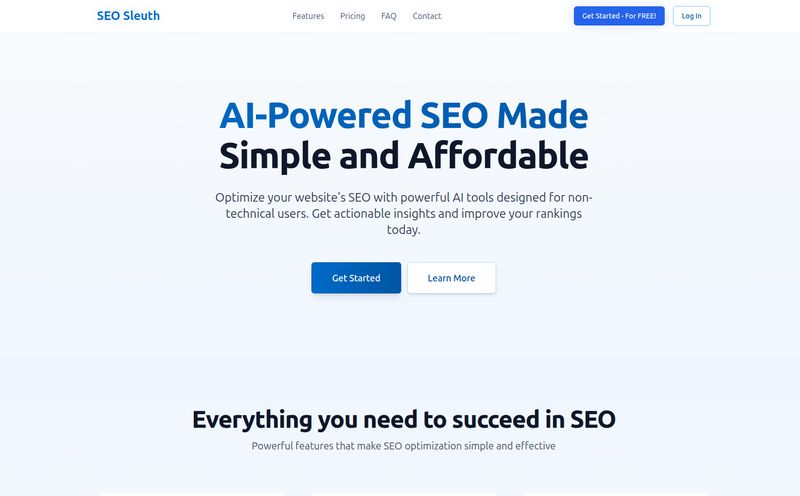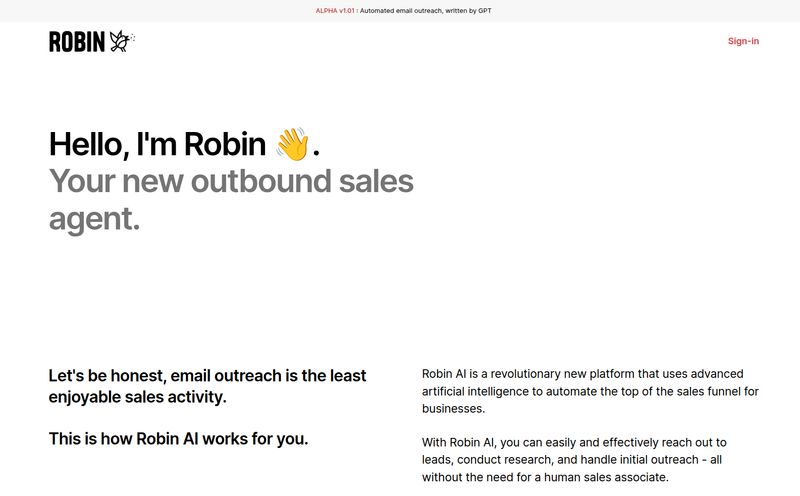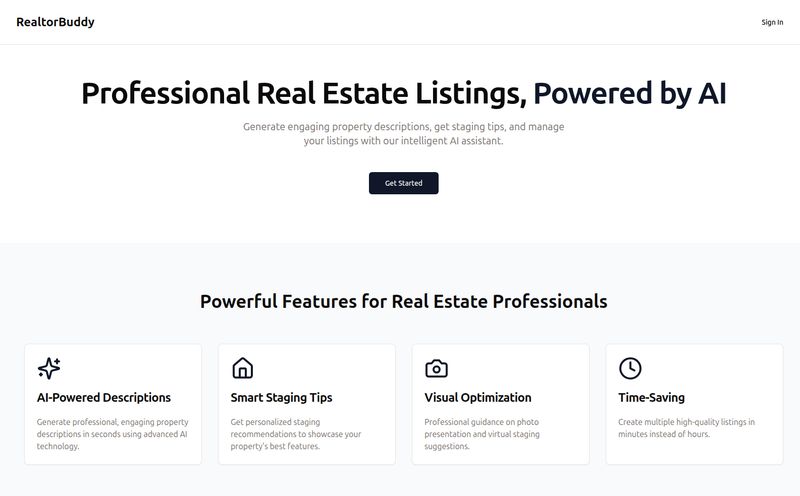If you're running a Shopify store, you're probably juggling a dozen things at once. Product sourcing, customer service, social media, a mountain of packing tape that seems to have a life of its own... you know the drill. And somewhere on that never-ending to-do list is 'email marketing'. We all know it's a goldmine. The ROI is legendary. But who has the time?
Between writing compelling copy, designing a non-ugly template, segmenting your lists, and figuring out what the heck a 'good' open rate is this week, it’s a full-time job. I’ve seen so many store owners just… give up. They send a sporadic newsletter once a quarter and hope for the best. It's a massive missed opportunity, but a completely understandable one.
This is where the whispers about AI marketing managers start to get louder. I've been hearing a lot about a tool called tinyAlbert (from the folks at tinyEinstein), which promises to put your Shopify email marketing on autopilot. An AI assistant that does the heavy lifting? Sounds great, but does it actually work? Or is it just another shiny object? I decided to take a closer look.
So, What Exactly is tinyAlbert?
In a nutshell, tinyAlbert is an AI-powered email marketing manager designed specifically, and I mean specifically, for Shopify stores. It’s not a generic email tool that you have to wrestle into working with your store. It was built from the ground up with Shopify's ecosystem in mind. Think of it less like a complicated new software you have to learn, and more like hiring a junior marketing assistant who’s surprisingly good at their job from day one.
It's designed to automate the most time-sucking email tasks: writing promotional emails, sending welcome messages, chasing down abandoned carts, and announcing new arrivals. The whole idea is to let you focus on running your business while the AI handles the email hustle in the background.
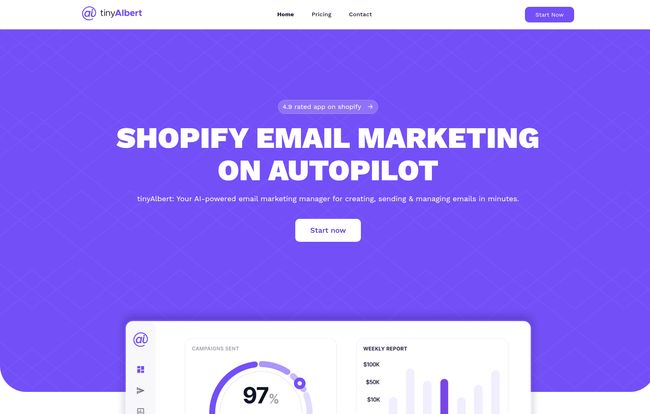
Visit tinyEinstein
Why an AI Assistant is No Longer a 'Nice-to-Have' for Ecommerce
It wasn't that long ago that personalization meant just using a customer's first name in the subject line. Cute, but we're way past that now. Customers expect you to know what they like. They want relevant offers, not a firehose of every single product you sell. And honestly, who can blame them?
Doing this manually is a nightmare. It means creating dozens of audience segments and unique campaigns. For a small business owner, that’s just not feasible. An AI tool like tinyAlbert can analyze customer behavior—what they've bought, what they've looked at, how often they buy—and then automatically group them. This means the right message goes to the right person, which is the secret sauce for boosting conversions. It’s about working smarter, not harder, a cliche I'm starting to actually believe in thanks to tools like this.
A Look at tinyAlbert’s Core Features
Okay, let's get into the guts of the machine. What does it actually do?
The AI Autopilot That Actually Flies the Plane
This is the main event. You connect the app to your Shopify store, set some basic preferences, and the AI gets to work. It generates copy, pulls in your product images, and schedules campaigns like holiday promotions, newsletters, and abandoned cart reminders. I was pretty impressed by the claim that you can be up and running in 30 minutes. In the world of SaaS, that's practically lightspeed. It means you can go from zero to a fully automated email strategy in less time than it takes to watch an episode of The Office.
Personalization That Goes Beyond '[First_Name]'
The real power here is the AI segmentation. The system automatically creates targeted campaigns for different customer groups. Think about it: a special offer for your VIP customers who buy every month, a gentle nudge for people who haven't purchased in a while, or a welcome series for brand new subscribers. This is the kind of stuff that usually requires a dedicated marketing team, but it's all handled automatically.
Analytics Without the Analysis Paralysis
If you've ever stared at a Google Analytics dashboard and felt your soul leave your body, you'll appreciate this. The analytics inside tinyAlbert are clean and straightforward. You see the important stuff: open rates, click-through rates, and most importantly, how much revenue each campaign is generating. It gives you the high-level view you need to see what's working without needing a degree in data science.
Let's Talk Money: The tinyAlbert Pricing Model
Ah, the question on everyone's mind. How much is this going to cost me? The pricing structure is one of my favorite things about tinyAlbert. It’s a flexible, pay-as-you-grow model based on your number of subscribers.
It starts at just $3 USD per month for up to 100 subscribers. This is brilliant for new stores. You're not forced into a pricey plan with features you don't need yet. You pay for what you use, and the cost scales as your audience grows. It’s a fair approach that removes a major barrier to entry for small businesses who are watching every penny. No scary annual contracts, no hidden fees. Refreshing, isnt it?
A Balanced View: The Good, The Bad, and The AI
No tool is perfect, and it's my job to give you the full picture. So here’s my honest take on the pros and the potential drawbacks.
The advantages are pretty clear. It saves a phenomenal amount of time, it genuinely helps boost conversions with its smart personalization, and the interface is incredibly user-friendly. For someone who dreads complex software, this is a huge plus. The pre-built templates and clear analytics are the cherries on top.
On the flip side, you have to be comfortable with the pricing scaling as you grow. If you have a massive list, the cost will obviously be higher than the initial $3. Also, while the AI is smart, it’s not a human. I'd always recommend proofreading the AI-generated copy to make sure it perfectly matches your brand's voice. Think of the AI as a talented writer that needs a quick final edit. Lastly, it’s a specialist tool. It does email marketing for Shopify, and it does it really well. If you're looking for an all-in-one suite that also manages your social media, SMS, and carrier pigeons, this ain't it.
Is tinyAlbert the Right Co-Pilot for Your Store?
So, who is this for? In my opinion, tinyAlbert is a near-perfect fit for a few key groups:
- Solopreneurs and small teams who are wearing all the hats and are seriously strapped for time.
- Shopify store owners who are new to email marketing and feel overwhelmed by the complexity of other platforms.
- Anyone who wants to implement sophisticated personalization without hiring a marketing agency or a full-time specialist.
If you're an enterprise-level brand with a 10-person marketing department and a custom-built CRM, you might have outgrown a tool like this. But for the vast majority of stores on Shopify, this could be a game-changer.
The Final Verdict
After digging into tinyAlbert, I'm genuinely optimistic. It's not just another app clogging up the marketplace. It solves a real, painful problem for Shopify merchants in a smart and accessible way. It bridges the gap between doing nothing with email and having to become a full-blown email marketing expert.
If you feel like you're leaving money on the table every time you fail to send out a campaign, this is a tool worth trying. It automates the grind, freeing you up to do what you do best: build a brand that people love. And for a few bucks to start, the potential return is massive.
Frequently Asked Questions
- How can tinyAlbert help my business?
- It helps you make more money by automating your email marketing. It sends personalized emails to customers to encourage repeat purchases, recover abandoned carts, and announce new products, all while saving you a ton of time.
- Do I need to be a Shopify store owner to use tinyAlbert?
- Yes. tinyAlbert is built exclusively for Shopify. It integrates directly with your store's data (products, customers, orders) to power its automation and personalization features.
- How does the AI-powered content generation work?
- The AI analyzes your store's products and brand information. It then writes email subject lines and body copy for various campaigns like promotions or newsletters. You can then review and tweak the copy before it gets sent.
- Do I need any design experience to use tinyAlbert?
- Nope! The platform comes with pre-built, professionally designed templates. It automatically pulls in your product images and branding, so your emails look great without any design work on your part.
- What is the pricing structure?
- tinyAlbert uses a subscriber-based pricing model. It starts at a very low cost for small lists and scales up as your subscriber count grows. This makes it affordable for businesses of all sizes.
